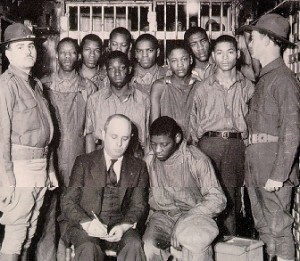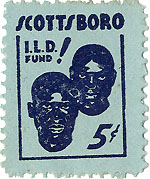About Central Park, Scottsboro, and The Need for Communists…
I just read a review of Ken Burns’ new documentary about the Central Park Jogger case. As I’ve mentioned before, I was born and mostly grew up in New York. In 1989, our city was rocked by the Central Park case. You had to be living in New York during that time in order to fully understand the media freakout over this case. You should read Chris Smith’s essay published last year to get a taste of the climate in NYC at the time.
 A white woman who was jogging in Central Park was brutally raped, beaten and left for dead. Within a few days, five black teenagers were rounded up and supposedly “confessed” to the terrible crime. It turned out to be a modern day replay of the Scottsboro case where nine black teenagers were falsely accused of raping two young white women on a railroad car in 1931.
A white woman who was jogging in Central Park was brutally raped, beaten and left for dead. Within a few days, five black teenagers were rounded up and supposedly “confessed” to the terrible crime. It turned out to be a modern day replay of the Scottsboro case where nine black teenagers were falsely accused of raping two young white women on a railroad car in 1931.
Thinking about the analogy between the Central Park jogger case and the Scottsboro trial has me longing for the heyday of the American Communist Party. Honestly for about a period of 20 years from 1930 to 1950, black criminal defendants never had better friends than the Communists. They were not wholly benevolent nor unproblematic allies. No. They were self-interested and often self-serving. But I would take that over what we have today which is to say generalized apathy.
I have very briefly written about the fact that the NAACP shied away from taking on cases that might be too controversial with regard to black criminal defendants. One example of this was Walter White’s initial reluctance to support the nine wrongfully accused Scottsboro boys. The NAACP was worried about taking on a case of black boys accused of raping a white woman in the South. What if they were actually guilty of the crime? The organization had spent several years trying to build its reputation as an upstanding civil rights organization. They didn’t want to risk losing that.
Since the NAACP was slow to act, the American Communist Party stepped into the breach. With eight of the Scottsboro boys scheduled to be executed in July 1931, it was the International Labor Defense (ILD) that sent a letter to Alabama’s governor demanding that the executions be stayed. The ILD wanted time to mount an appeal on behalf of the boys. Just 72 hours before they were scheduled to be executed in the electric chair, the court issued a stay. In reading about the history of the case, it seems almost certain that those young men would have quickly been put to death if it hadn’t been for the ILD’s intervention and the tireless advocacy work of the young men’s family members particularly Mrs. Ada Wright. The ILD mobilized mass demonstrations across the U.S. and the world in support of the Scottsboro boys. You can check out a good online exhibition of some of the Scottsboro protest materials created by the ILD.I think that discussions about American Communists’ role in supporting many black criminal defendants in the early to mid-20th century has been obscured because it is commonly believed that the communists were all white people. When black communists are mentioned, they are usually cast as secondary and perhaps even subjugated actors in the stories. Robin D. G. Kelley is one scholar who has done a lot of reclaim the history of black communists and to provide a revised assessment of their role within the Party. If you are interested in this general history, read Kelley’s Hammer and Hoe and Race Rebels
With respect to the Scottsboro case in particular, some of the key black communists who played a role in fighting for justice for the young defendants were William L. Patterson who was the head of the International Labor Defense, B.D. Amis who was a protege of Ida B. Wells-Barnett, Harry Haywood, George Padmore, Cyril Briggs, and Angelo Herndon, to name just a few. It’s OK if you don’t recognize any of these names. It wasn’t until I started reading more in depth about Scottsboro (maybe 10 years ago) that I myself came to know who they were. I never heard or read about these men in my American history classes or during Black history month celebrations. It’s a shame that the contributions of so many black people are lost to us today.
Many of the black communists that I reference above believed that organizations like the NAACP and the Urban League were mainly interested in being seen as respectable to the white liberal elites who comprised their membership and were their major donors. They saw the American Communist Party as a vehicle for black people to become autonomous race warriors. Yet their membership in the Party was not without its own complications. I am fascinated by black people’s role in the American Communist Party and can drone on and on about it but I will stop myself now. If you are interested in this history, do read Robin Kelley’s work or Mark Naison’s work addressing Harlem Communists in the 30s and 40s.
Ultimately, the Scottsboro case stretched out across four decades and taken together the defendants spent 130 years locked behind bars. As one of the “defining moments of the 20th century,” the case deserves to be better understood for its applications to our current era. I really hope that more people will write about this. In the meantime, a number of black communists wrote pieces about the Scottsboro case. For example, Angelo Herndon wrote a pamphlet in 1937 which you can download HERE. Since I am semi-obsessed about this period in history, I am sure that this is not the last that you will read about the Communists on this blog 🙂

